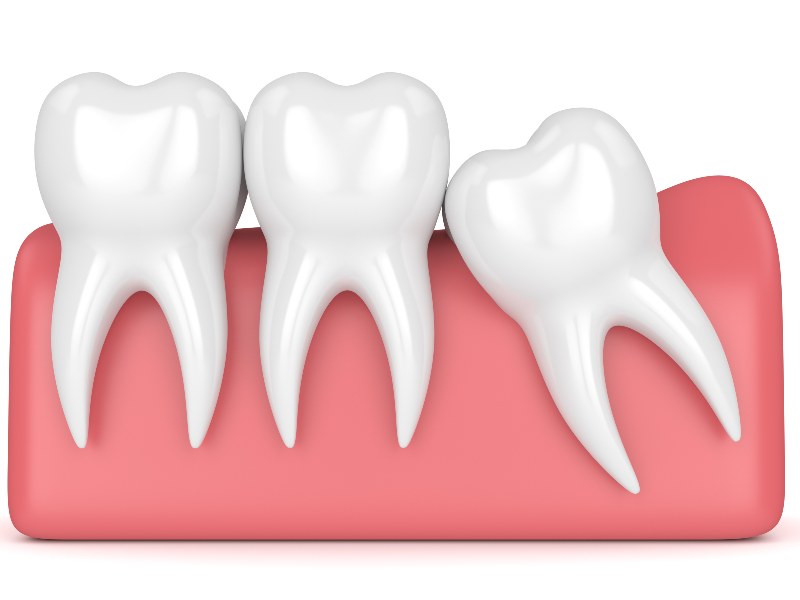The decision to extract a tooth is never taken lightly, as preserving your natural teeth whenever possible remains the primary goal of modern dentistry and general dentistry in particular. However, certain circumstances make tooth extraction the most appropriate treatment to protect your overall oral health and prevent more serious complications.
Whether dealing with severe decay that has compromised the tooth’s structure, advanced gum disease that has destroyed supporting tissues, or overcrowding that interferes with proper alignment, tooth extraction can provide relief from pain while setting the stage for effective restoration options. While some extraction services can involve some pain during the process and through the first 3-4 days after the tooth is removed, overall, it normally results in a great deal of pain relief once the affected area has healed.

At JAX Dental Studio, Dr. Charles Poblenz approaches every extraction with careful consideration and thorough planning to ensure the most comfortable experience possible. Our Jacksonville team understands the prospect of tooth removal can cause anxiety, which is why we take the time to thoroughly explain the procedure, discuss your comfort options, and outline the steps we’ll take to promote healing and plan for any necessary tooth replacement solutions.

Tooth decay is the most common reason for tooth removal.
To begin, your dentist will clean and disinfect the treatment site in preparation for the extraction procedure.
Your dentist will use local anesthesia to numb the extraction site and the nerves that surround it, ensuring that you feel no pain or discomfort during the procedure.
We may recommend, or you may request, sedation for your tooth extraction. Sedation is helpful for anxious patients and can make you more comfortable during longer extraction procedures.
Your dentist will gently loosen the tooth in the socket using special dental tools. When it has been loosened sufficiently, they will pull it out with a pair of dental forceps.
When the tooth has been removed, your dentist will clean and disinfect the area again, and suture the extraction site to ensure it heals properly.
You’ll be sent home to heal and recover, and your dentist will provide you with a comprehensive set of instructions that will ensure your mouth heals as quickly as possible.
Comprehensive dental care accessible to all families regardless of insurance type or coverage limitations.

Tooth extraction is recommended when preserving a natural tooth is no longer feasible or when removal serves the patient’s best long-term oral health interests. Several specific conditions and circumstances make patients good candidates for tooth extraction, ranging from severe dental damage to strategic orthodontic planning.
Patients with severely decayed teeth that cannot support a filling, crown, or root canal therapy often benefit from extraction followed by appropriate replacement options. Advanced periodontal disease that has destroyed the supporting bone and ligaments around a tooth may also necessitate removal to prevent the spread of infection to adjacent teeth and tissues.
Common situations where tooth extraction may be recommended include the following:
Emergencies also create extraction candidates when severe dental trauma causes damage beyond repair, requiring immediate removal to address pain and prevent infection.
The ideal extraction candidate understands the procedure, follows pre- and post-operative instructions carefully, and commits to discussing tooth replacement options when appropriate. Patients with compromised immune systems, those undergoing radiation therapy, or individuals preparing for organ transplants may need extractions of teeth with even minor problems to prevent potential infections. Good candidates should be in generally good health or have well-controlled medical conditions, as this promotes proper healing and reduces complications following the extraction procedure.
To begin, your dentist will clean and disinfect the treatment site in preparation for the extraction procedure.
Your dentist will use local anesthesia to numb the extraction site and the nerves that surround it, ensuring that you feel no pain or discomfort during the procedure.
We may recommend, or you may request, sedation for your tooth extraction. Sedation is helpful for anxious patients and can make you more comfortable during longer extraction procedures.
Your dentist will gently loosen the tooth in the socket using special dental tools. When it has been loosened sufficiently, they will pull it out with a pair of dental forceps.
When the tooth has been removed, your dentist will clean and disinfect the area again, and suture the extraction site to ensure it heals properly.
You’ll be sent home to heal and recover, and your dentist will provide you with a comprehensive set of instructions that will ensure your mouth heals as quickly as possible.
Proper preparation for tooth extraction helps ensure a smooth procedure and optimal healing afterward. Your preparation begins with providing complete medical and dental history information during your consultation, including all medications, supplements, and any medical conditions that could affect the procedure or healing process.
Dr. Poblenz will review your X-rays and examine the tooth to determine the best extraction approach. For complex extractions, additional imaging may be necessary to plan the procedure thoroughly. You’ll receive detailed pre-operative instructions tailored to your specific situation, which should be followed carefully to minimize complications.
Several important steps help prepare you for extraction day:
If you take blood-thinning medications, Dr. Poblenz may coordinate with your physician to adjust your dosing schedule. Patients with certain heart conditions may require antibiotic premedication to prevent infection. Smokers should avoid tobacco products for at least 24 hours before the procedure, as smoking can interfere with healing.
Mental preparation is equally important. Understanding what to expect during and after the procedure helps reduce anxiety. Don’t hesitate to ask questions about the process, pain management options, or post-operative care. Having realistic expectations and following all pre-operative instructions sets the foundation for a successful extraction experience and smooth recovery period.
Basic extractions are typically used for teeth that have been damaged by oral injuries, gum disease, or tooth decay. We will always try to save your tooth first, but sometimes extraction may be necessary.
For example, if a tooth is severely infected, it may not be possible to save it with a root canal. Instead, your dentist may recommend an extraction. Restorative treatment, like a dental implant, a dental bridge, or a partial denture, can be used to replace your missing tooth.
Wisdom teeth are the third set of molars, and are a natural part of our mouths. However, they grow in much later than the rest of our teeth, usually between the ages of 17-25. Because of this, many people do not have enough space in their mouths for wisdom teeth, particularly if they have had orthodontic work.
That means that the wisdom teeth can cause issues with your other teeth when they begin to erupt. They may cause your other teeth to shift and become misaligned, or they may become impacted and get infected. Wisdom teeth tend to cause discomfort, which is why most people choose to have them extracted when they begin to emerge.
Impacted wisdom teeth are one of the most common complications related to wisdom tooth eruption. When your wisdom tooth is “impacted,” this means that it has not fully erupted from your gums.
Impacted wisdom teeth can also affect the position and health of the adjacent teeth, particularly if they’re growing in crooked. In addition, these partially erupted teeth can catch food debris and bacteria, leading to a higher risk of a tooth abscess or infection.
Because they have not fully erupted, most impacted wisdom teeth must be removed surgically. In a surgical extraction, your dentist will numb and clean the extraction site, then make a very small incision in the gum tissue near the impacted tooth. The impacted tooth is removed through the incision in the gum tissue. Once the entire tooth structure has been completely extracted, your dentist will clean and sanitize the area and suture it shut.
An extraction may be necessary for orthodontic reasons like overcrowding.
The most common reason for tooth extractions is the improper growth of wisdom teeth. If your wisdom teeth are impacted or are otherwise not growing in properly, they may need to be removed to ensure that your other teeth remain healthy. However, not everyone needs their wisdom teeth to be removed, so it’s best to consult with your dentist to find out if your wisdom teeth are or will be a problem.
Tooth extractions may also be necessary if you have an extremely severe cavity, severe damage from oral trauma, or an infected tooth that cannot be saved with root canal therapy. In most cases, it is possible to save your tooth with a crown or root canal therapy, but sometimes extraction may be your only option.
Some patients with severe gum disease may require tooth extractions. In its most severe stages, periodontal disease causes teeth to become loose and eventually fall out. Your doctor may want to extract these teeth to prepare you for a strong and long-lasting tooth replacement option. Extractions are required to prepare patients for these treatments, including the placement of dental implants or dentures.
You won’t feel any pain or discomfort during or immediately after your extraction due to the numbing and sedation used during the procedure. However, you will start to experience symptoms including pain, discomfort, swelling, bruising, and bleeding within a few hours following your extraction. These symptoms usually peak within the first 2-3 days, and then start to fade as you heal. You will typically need to eat a diet of mostly soft foods for about 5-7 days after your treatment, so plan accordingly.
Overall, it will take about 1-2 weeks for your extraction site to heal completely. Following the recovery instructions provided to you by your dentist will enhance your healing progress. If you are still feeling a lot of pain and discomfort 1-2 weeks after your extraction, this is not normal. Contact your dentist for a follow-up appointment.
Usually. Tooth extractions that are required to remove impacted wisdom teeth, or damaged or decayed teeth, are typically covered by insurance. However, we recommend that you contact your insurance provider and work with them to fully understand your coverage and benefits.
A tooth extraction, as the name suggests, is a dental procedure that involves the removal of a tooth from its socket in the bone. It’s a common dental procedure performed by dentists like Dr. Charles Poblenz at JAX Dental Studios in Jacksonville, FL. Extractions are typically done when a tooth is too damaged or decayed to be repaired, or in cases where there’s overcrowding in the mouth, or to prevent complications from impacted teeth.
The procedure is typically done under local anesthesia, ensuring that the patient experiences minimal discomfort.
After a tooth extraction, you can eat, but it’s important to stick to soft foods and liquids for the first few days to avoid disturbing the extraction site. Foods like yogurt, pudding, soup, applesauce, and mashed potatoes are ideal. You should also stay hydrated by drinking plenty of water, but avoid using a straw as the suction could dislodge the blood clot that forms in the extraction site, leading to a painful condition known as dry socket.
As your mouth heals, you can gradually reintroduce more solid foods into your diet. It’s also advisable to avoid spicy foods, alcohol, and smoking during the healing process as these can irritate the extraction site.
The healing process after a tooth extraction varies from person to person and depends on the complexity of the extraction. Generally, the initial healing period, during which a blood clot forms in the socket to protect the bone and nerves underneath, takes about one to two weeks. New bone and gum tissue will grow into the gap over the next few months.
However, it’s important to note that everyone heals at their own pace. It’s crucial to follow all aftercare instructions provided by your dentist to ensure a smooth and speedy recovery.
At JAX Dental Studios, we prioritize patient comfort and well-being. A tooth extraction is typically done under local anesthesia, which numbs the area around the tooth to be extracted. This means you should not feel any pain during the procedure itself. After the anesthesia wears off, it’s normal to experience some discomfort and swelling.
However, this can usually be managed with over-the-counter pain relievers and by applying a cold compress to the affected area. If you experience severe or prolonged pain after an extraction, it’s important to contact your dentist as soon as possible.
When tooth extraction becomes necessary, choosing an experienced dentist who prioritizes your comfort and long-term oral health makes all the difference in your treatment experience. Dr. Charles Poblenz combines years of clinical expertise with a compassionate approach to help patients through every step of the extraction process. Our Jacksonville team utilizes advanced techniques and comfort options to ensure extractions are performed as gently as possible while promoting optimal healing.
Following your extraction, we’ll work closely with you to develop a comprehensive plan for maintaining your oral health and exploring tooth replacement options when appropriate. From simple extractions to more complex surgical procedures, JAX Dental Studio provides the skilled care you need in a comfortable, supportive environment. Don’t let dental pain or problematic teeth compromise your quality of life any longer. Contact JAX Dental Studio at (904) 396-4091 or visit our contact form to schedule your consultation and learn how we can help restore your oral health with professional, gentle care.

Most patients can return to work or school within 2-3 days days following an extraction.